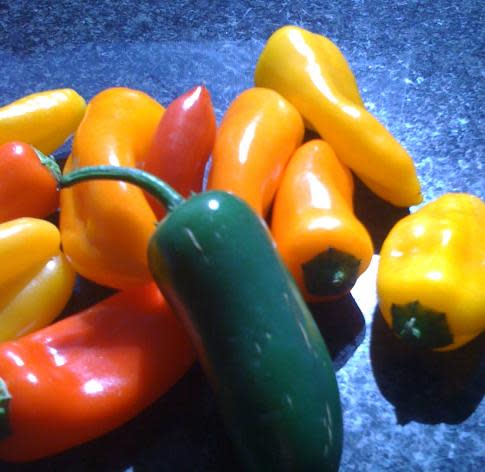Can Hot Peepers Help You Lose Weight?

A new chili pepper was recently crowned the hottest of the hot. It's called the Trinidad Moruga Scorpion and has a measured spiciness of 2,000,000 Scoville heat units, which brings it to the level of law enforcement grade pepper spray. Care for a bite?
Hot peppers and weight loss
Hot peppers have many culinary and nutritional benefits, and have also been used for topical pain relief. One of the interesting research areas of hot chili peppers is their alleged capacity to aid in weight loss.
A few studies showed that eating good amounts of hot peppers might increase energy production as heat temporarily in rats and in people. Increasing energy expenditure's a good thing - we'd love to burn extra calories without hard work.
The active ingredient in hot peppers is capsaicin. Capsaicin also gives peppers their pungency, which limits the amounts people can comfortably eat without hitting the ceiling.
Brown fat and spicy peppers
Hot pepper's capsaicin weight loss effect on rats and mice can be explained by the rodents' elevated temperature after ingestion. Rodents' brown fat, which usually burns energy and creates heat during cold exposure, showed elevated activity and temperature after eating capsaicin.
Scientists once thought that brown fat was only present in babies. We now know that brown fat can also be detected in about 50 percent of healthy adults, that the human body is capable of creating new brown fat cells throughout life, and that the amount of brown fat in the body may affect the likelihood of obesity.
Might brown fat activity explain hot peppers' metabolic effect on humans too?
A new study published in the American Journal of Clinical Nutrition started by measuring the brown fat activity of 18 healthy young men. The men underwent a special PET scan exposed to a temperature of 66 °F, while intermittently placing their feet on a block of ice. Ten of the 18 men had brown fat activity, and 8 had no such activity.
Next, the researchers exposed both the men with brown fat and the men without brown fat to capsinoids. Capsinoids are similar to capsaicin in formula, but aren't that spicy. They come from a unique variety of non-spicy chili peppers, CH-19 Sweet, and have been shown to have effects similar to capsaicin. The energy expenditure of both groups was similar before ingesting the capsinoids. The brown fat positive group's energy expenditure increased after capsinoids ingestion, but not after ingesting placebo. On the other hand, the men who had no detectable brown fat showed no increase in energy expenditure after capsinoids ingestion or after ingesting placebo.
How much increase in energy burning are we talking about? The brown fat endowed's extra energy burn in the hour after ingesting their hot pepper analog was an average of about 15 kilojoule an hour.
To put this number in more understandable terms, 15 kilojoules are about 4 of our familiar calories. All this hot pepper earned eaters an extra piece of chewing gum.
Spiciness is a nice add-on
Hot pepper weight-loss research, though exciting, brings one down to earth regarding the possibility of a magic remedy soon replacing the true but unpleasant advice of "eat fewer calories and exercise more". Under the best of circumstances, adding palatable level of spiciness will result in very modest weight loss, and we're not at all sure about the long-term effects of hot peppers, as people may adapt to the effects of capsaicin over time.
If you enjoy spicy food, look at hot pepper as a nice add-on. It has shown some activity, similar to that of green tea and caffeine. But by all means don't see hot sauce as an excuse to eat more, or hope that it can help you lose weight without decreasing overall caloric intake.
I happen to love spicy food, and tiny amounts of hot pepper flakes make it into many of the dishes I cook, but I've come to realize that what I perceive as tingling pleasure, others feel as pain and embarrassment, so I serve the hot sauce on the side.
Dr. Ayala
Read more from Dr. Ayala at http://herbalwater.typepad.com
Follow Dr. Ayala on Twitter
